Unit 10 You’re supposed to shake hands. Section B 2a-2e阅读课件37张
文档属性
| 名称 | Unit 10 You’re supposed to shake hands. Section B 2a-2e阅读课件37张 | 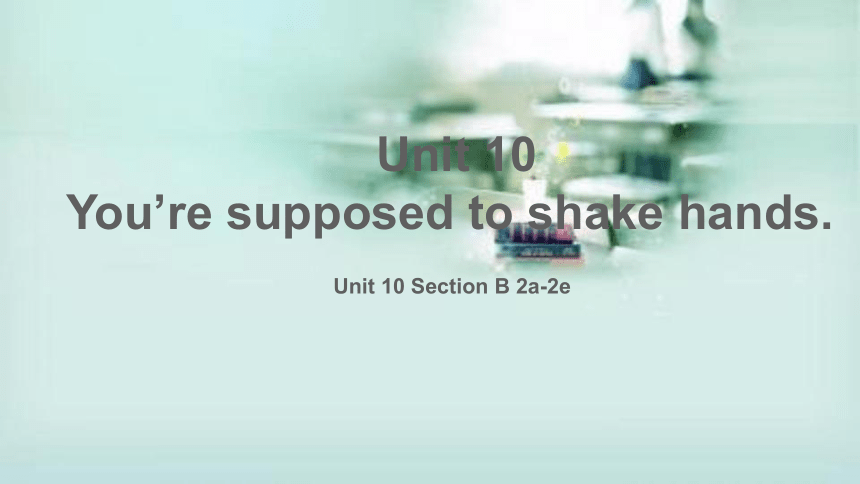 | |
| 格式 | pptx | ||
| 文件大小 | 17.3MB | ||
| 资源类型 | 教案 | ||
| 版本资源 | 人教新目标(Go for it)版 | ||
| 科目 | 英语 | ||
| 更新时间 | 2022-04-13 09:16:40 | ||
图片预览

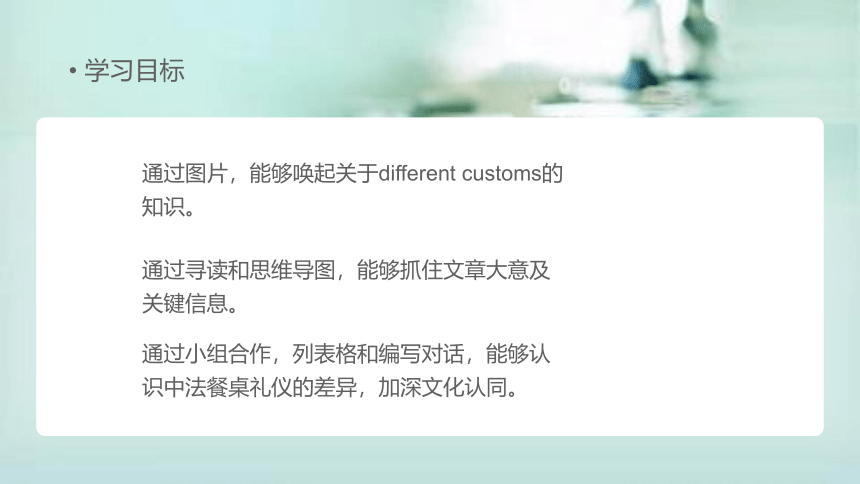
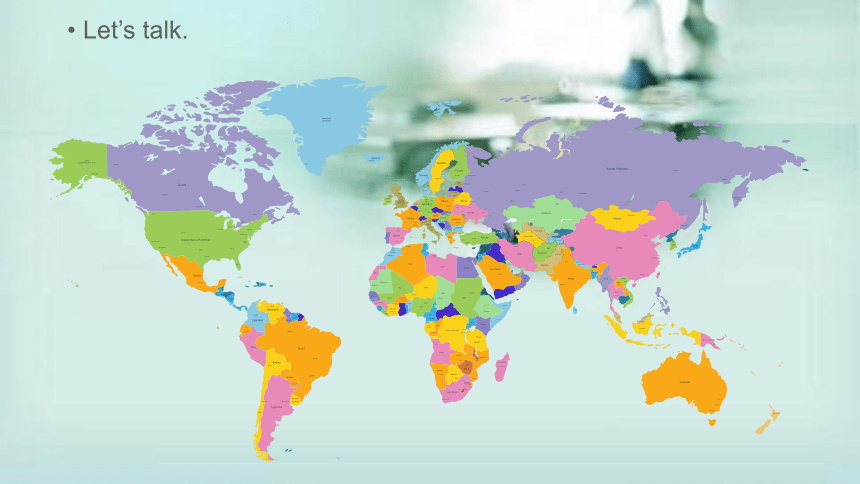
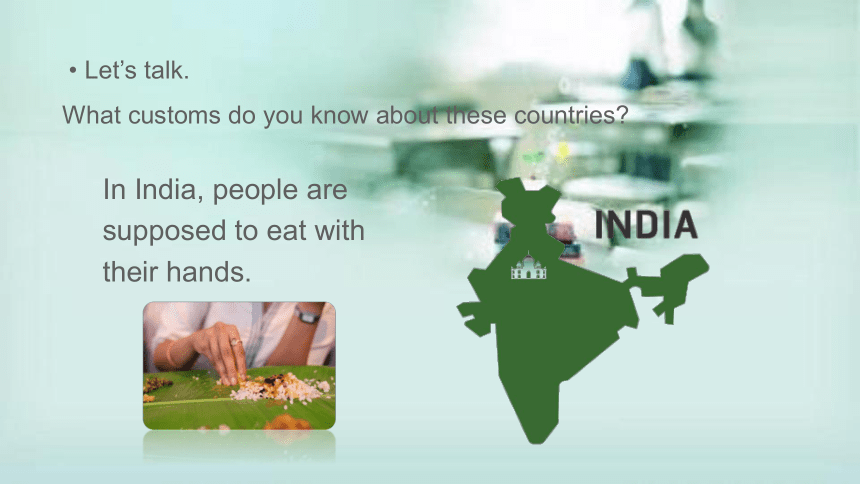
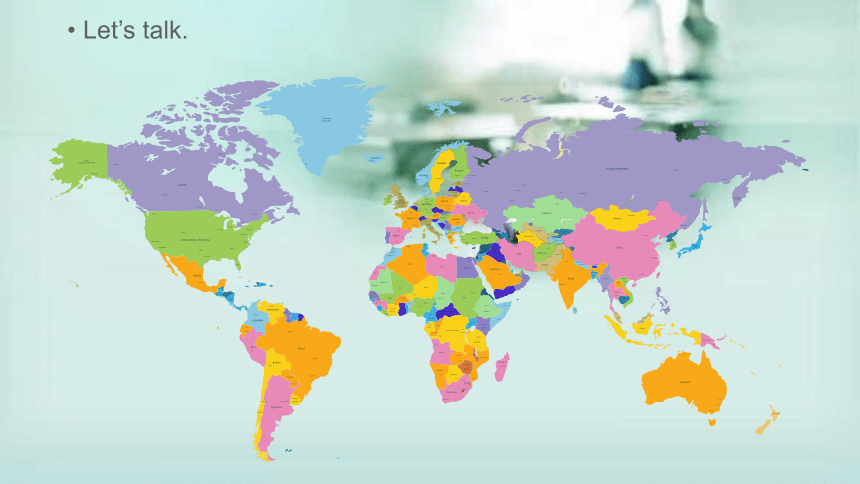
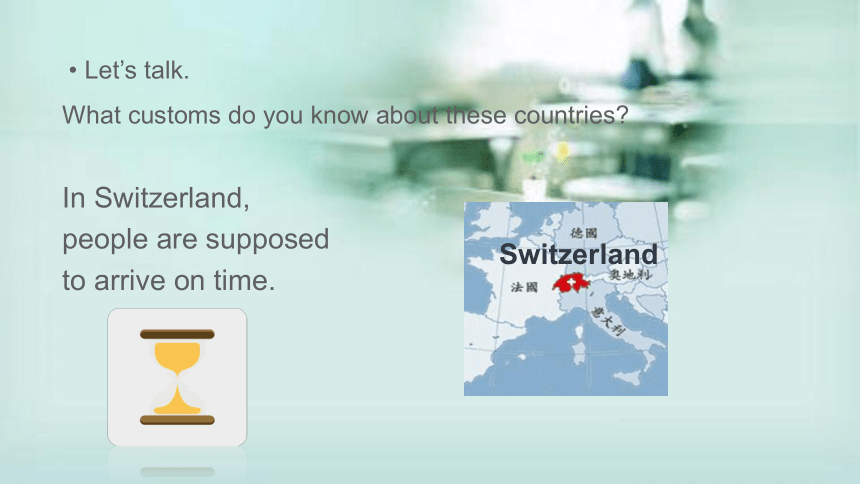
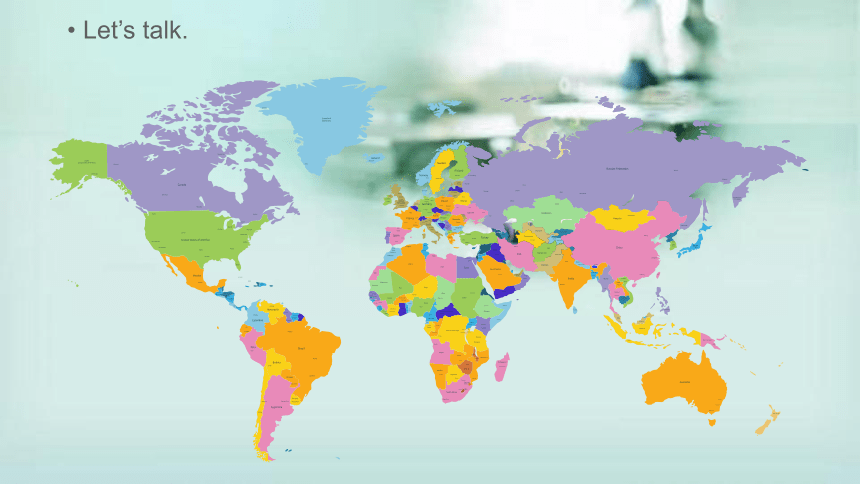
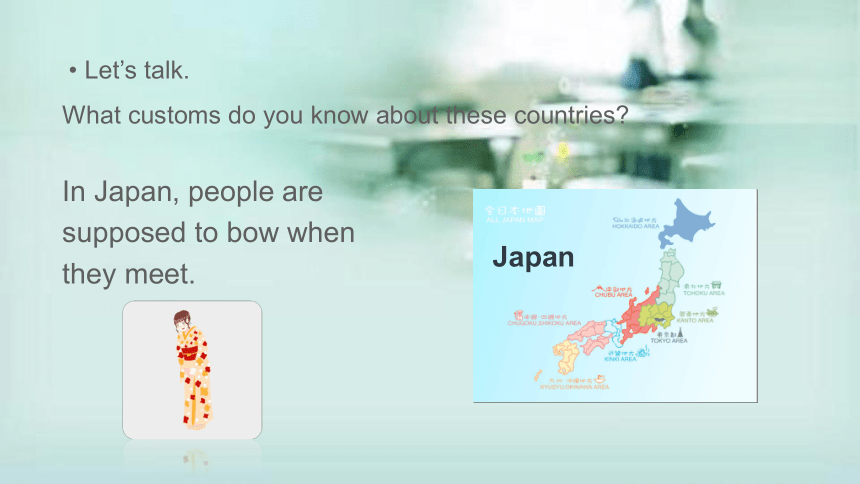
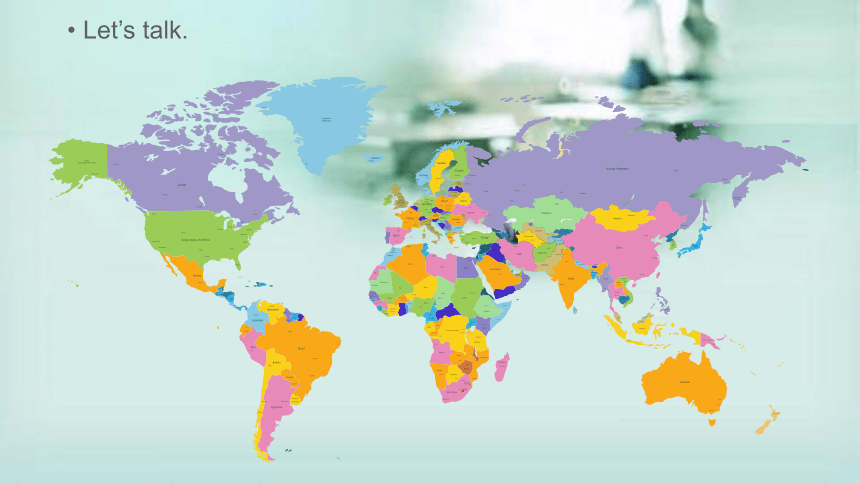
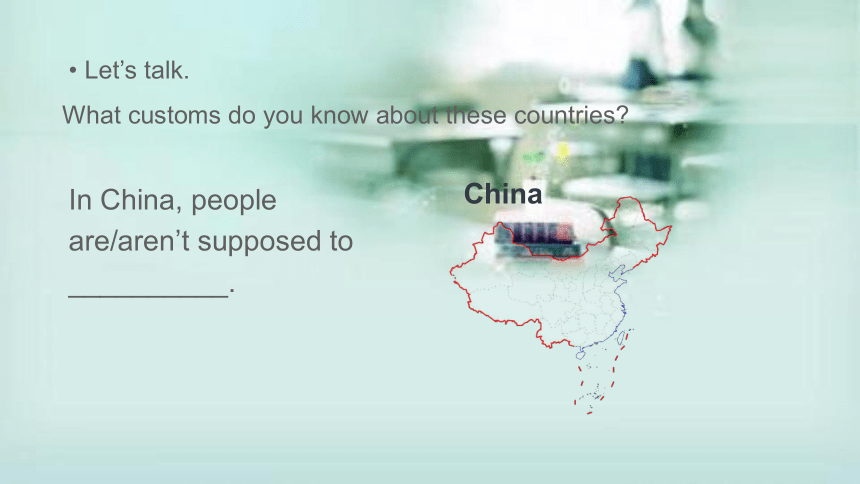
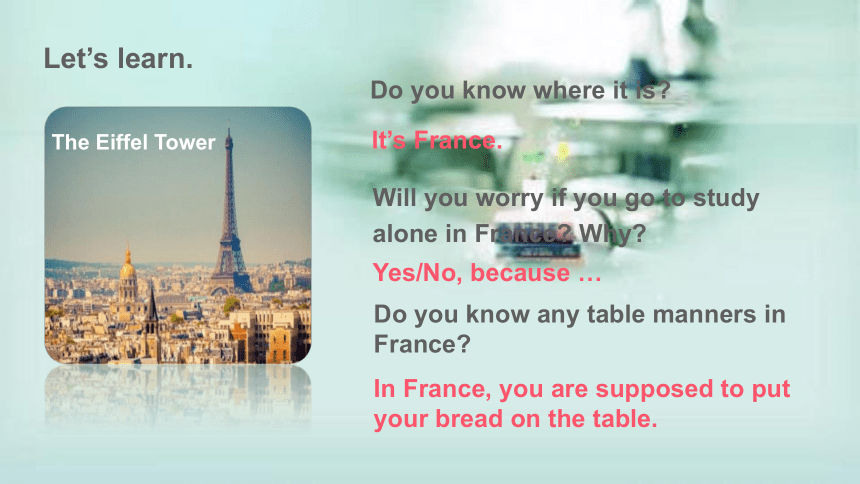
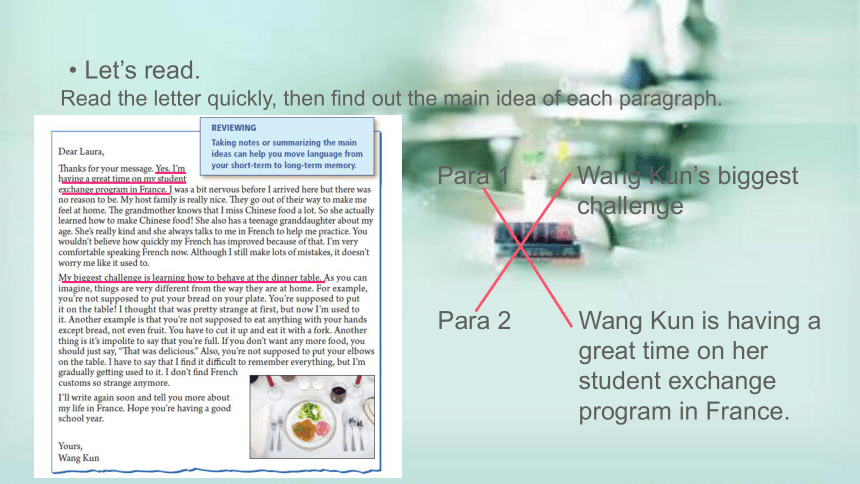
文档简介
(共37张PPT)
Unit 10
You’re supposed to shake hands.
Unit 10 Section B 2a-2e
学习目标
通过图片,能够唤起关于different customs的知识。
通过寻读和思维导图,能够抓住文章大意及关键信息。
通过小组合作,列表格和编写对话,能够认识中法餐桌礼仪的差异,加深文化认同。
Let’s talk.
Let’s talk.
What customs do you know about these countries
In India, people are supposed to eat with their hands.
Let’s talk.
Let’s talk.
What customs do you know about these countries
In Switzerland, people are supposed to arrive on time.
Switzerland
Let’s talk.
Let’s talk.
What customs do you know about these countries
In Japan, people are supposed to bow when they meet.
Japan
Let’s talk.
Let’s talk.
What customs do you know about these countries
In China, people are/aren’t supposed to __________.
China
Let’s learn.
Do you know where it is
The Eiffel Tower
Do you know any table manners in France
It’s France.
In France, you are supposed to put your bread on the table.
Will you worry if you go to study alone in France Why
Yes/No, because …
Let’s read.
Read the letter quickly, then find out the main idea of each paragraph.
阅读策略:main idea is usually at the beginning of each paragraph.
Para 1
Para 2
Wang Kun is having a great time on her student exchange program in France.
Wang Kun’s biggest challenge
Let’s read.
Why is Wang Kun in France
She wants to know more table manners.
She wants to learn French.
She is on her student exchange program.
2. Does she enjoy staying with her host family How do you know
Yes, she does. She says her host family is really nice.
Yes, but there was no reason.
Yes, she doesn’t worry about making mistakes in speaking French.
3. How does she feel about making mistakes when she speaks French now
Shy.
Unworried.
Nervous.
Para. 1
Let’s read.
Para. 2
How do you behave at the dinner table in France
Where do you put your bread
How do you eat
What do you say if you don’t want more food
Where do you put your elbows
On the ________
On your plate
Cut it up and eat it with a(n) _______
Eat anything with your hands except bread.
1. I’m full.
2. That’s ________.
1. On the table
2. Not on the table
table
fork
delicious
Let’s play.
Work in groups, move those things into proper place.
Where do you put your knife, spoon and forks
Let’s play.
Work in groups, move those things into proper place.
Where do you put your bread
Let’s play.
Work in groups, choose the right answer.
Where do you put your elbows
Let’s play.
Work in groups, choose the right answer.
How do you eat
Let’s play.
Work in groups, compare table manners in France and China, then make a poster.
What do you say if you don’t want more food?
in France
in China
I’m full.
That’s delicious.
Let’s compare.
Work in groups, compare table manners in France and China, then make a poster.
Table manners
In France, you are supposed to eat with forks and knives.
In China, you’re supposed to eat with chopsticks and spoons.
Let’s compare.
Work in groups, compare table manners in France and China, then make a poster.
Table manners
In France, you’re supposed to cut up your fruit and eat with a fork.
In China, you can eat fruits whole.
Let’s compare.
Work in groups, compare table manners in France and China, then make a poster.
Table manners
In France, you’re supposed to say “That’s delicious.” if you don’t want more food.
In China, you’re supposed to say “I’m full.” if you don’t want more food.
That’s delicious.
I’m full.
Let’s make a poster.
Work in groups of four, make a poster about table manners in France and China.
Introduce table manners in France.
Introduce table manners in China.
Compare them.
Add other table manners you know.
Let’s check.
评价内容 1 2 3 4 5
能够回忆已学习的风俗习惯。
能够利用略读等策略找到文章关键信息。
能够通过对话表演,感知不同的文化差异。
used to
Let’s study.
中
过去……曾经……
例
I used to be a dancer.
拓
used to do sth. 过去做某事
used to be 曾经是…..
Let’s study.
练
他过去开车去上班,但是现在习惯走路上班。
He ______ _______ drive to work, but he is now used to _______.
used
to
walking
behave
Let’s study.
中
v. 表现
例
My biggest challenge is learning how to behave at the dinner table.
拓
behavior n. 行为举止
Let’s study.
练
Your mother will blow up at you if you don’t ________ (表现) well.
behave
Let’s study.
练
You must ___________ (表现) well in front of the guest.
behave
go out of one’s way
Let’s study.
中
格外努力地
例
The host family go out of their way to help me.
拓
go out of one’s way to do sth.
Let’s study.
练
他格外努力地帮助他的同学。
He ______ _______ _______ _________ ________ ______ help his classmates.
goes
out
of
his
way
to
except
Let’s study.
中
除了,表示从整体中除去,不包括后者
例
Everyone finished homework except Alan.
拓
besides: 除……之外,还有,包括后面。
Besides English, you must learn Chinese.
Let’s study.
练
The restaurant is open every day __________ (除了) Monday.
except
Let’s study.
练
--Alice, would you like to go hiking with us today
-- What a pity! I am free every day ______ today.
for B. except
C. besides D. among
解析:
今天排除在外,选except
2b
What is the biggest challenge she is facing
Her biggest challenge is learning how to behave at the dinner table.
2c
Read the sentences and replace the underlined words with the phrases in the box.
1. Making mistakes in French used to make Wang Kun nervous.
2. It was quite hard for her to feel good about speaking French.
3. The host family tried very hard to help Wang Kun.
4. Wang Kun has slowly learned how to be like her French friends.
went out of their way
be comfortable (doing)
gradually gotten used to being
(something) worry (someone)
2d
Dos Don’ts
1. Put your bread on your table. 2. Cut up your fruit and eat it with a fork. 3. Say “That’s delicious.” if you don’t want any more food. Eat anything with your hands except bread.
Say you’re full.
Put your bread on your plate.
Put your elbows on the table.
Review the passage and make notes about French customs in the chart.
Unit 10
You’re supposed to shake hands.
Unit 10 Section B 2a-2e
学习目标
通过图片,能够唤起关于different customs的知识。
通过寻读和思维导图,能够抓住文章大意及关键信息。
通过小组合作,列表格和编写对话,能够认识中法餐桌礼仪的差异,加深文化认同。
Let’s talk.
Let’s talk.
What customs do you know about these countries
In India, people are supposed to eat with their hands.
Let’s talk.
Let’s talk.
What customs do you know about these countries
In Switzerland, people are supposed to arrive on time.
Switzerland
Let’s talk.
Let’s talk.
What customs do you know about these countries
In Japan, people are supposed to bow when they meet.
Japan
Let’s talk.
Let’s talk.
What customs do you know about these countries
In China, people are/aren’t supposed to __________.
China
Let’s learn.
Do you know where it is
The Eiffel Tower
Do you know any table manners in France
It’s France.
In France, you are supposed to put your bread on the table.
Will you worry if you go to study alone in France Why
Yes/No, because …
Let’s read.
Read the letter quickly, then find out the main idea of each paragraph.
阅读策略:main idea is usually at the beginning of each paragraph.
Para 1
Para 2
Wang Kun is having a great time on her student exchange program in France.
Wang Kun’s biggest challenge
Let’s read.
Why is Wang Kun in France
She wants to know more table manners.
She wants to learn French.
She is on her student exchange program.
2. Does she enjoy staying with her host family How do you know
Yes, she does. She says her host family is really nice.
Yes, but there was no reason.
Yes, she doesn’t worry about making mistakes in speaking French.
3. How does she feel about making mistakes when she speaks French now
Shy.
Unworried.
Nervous.
Para. 1
Let’s read.
Para. 2
How do you behave at the dinner table in France
Where do you put your bread
How do you eat
What do you say if you don’t want more food
Where do you put your elbows
On the ________
On your plate
Cut it up and eat it with a(n) _______
Eat anything with your hands except bread.
1. I’m full.
2. That’s ________.
1. On the table
2. Not on the table
table
fork
delicious
Let’s play.
Work in groups, move those things into proper place.
Where do you put your knife, spoon and forks
Let’s play.
Work in groups, move those things into proper place.
Where do you put your bread
Let’s play.
Work in groups, choose the right answer.
Where do you put your elbows
Let’s play.
Work in groups, choose the right answer.
How do you eat
Let’s play.
Work in groups, compare table manners in France and China, then make a poster.
What do you say if you don’t want more food?
in France
in China
I’m full.
That’s delicious.
Let’s compare.
Work in groups, compare table manners in France and China, then make a poster.
Table manners
In France, you are supposed to eat with forks and knives.
In China, you’re supposed to eat with chopsticks and spoons.
Let’s compare.
Work in groups, compare table manners in France and China, then make a poster.
Table manners
In France, you’re supposed to cut up your fruit and eat with a fork.
In China, you can eat fruits whole.
Let’s compare.
Work in groups, compare table manners in France and China, then make a poster.
Table manners
In France, you’re supposed to say “That’s delicious.” if you don’t want more food.
In China, you’re supposed to say “I’m full.” if you don’t want more food.
That’s delicious.
I’m full.
Let’s make a poster.
Work in groups of four, make a poster about table manners in France and China.
Introduce table manners in France.
Introduce table manners in China.
Compare them.
Add other table manners you know.
Let’s check.
评价内容 1 2 3 4 5
能够回忆已学习的风俗习惯。
能够利用略读等策略找到文章关键信息。
能够通过对话表演,感知不同的文化差异。
used to
Let’s study.
中
过去……曾经……
例
I used to be a dancer.
拓
used to do sth. 过去做某事
used to be 曾经是…..
Let’s study.
练
他过去开车去上班,但是现在习惯走路上班。
He ______ _______ drive to work, but he is now used to _______.
used
to
walking
behave
Let’s study.
中
v. 表现
例
My biggest challenge is learning how to behave at the dinner table.
拓
behavior n. 行为举止
Let’s study.
练
Your mother will blow up at you if you don’t ________ (表现) well.
behave
Let’s study.
练
You must ___________ (表现) well in front of the guest.
behave
go out of one’s way
Let’s study.
中
格外努力地
例
The host family go out of their way to help me.
拓
go out of one’s way to do sth.
Let’s study.
练
他格外努力地帮助他的同学。
He ______ _______ _______ _________ ________ ______ help his classmates.
goes
out
of
his
way
to
except
Let’s study.
中
除了,表示从整体中除去,不包括后者
例
Everyone finished homework except Alan.
拓
besides: 除……之外,还有,包括后面。
Besides English, you must learn Chinese.
Let’s study.
练
The restaurant is open every day __________ (除了) Monday.
except
Let’s study.
练
--Alice, would you like to go hiking with us today
-- What a pity! I am free every day ______ today.
for B. except
C. besides D. among
解析:
今天排除在外,选except
2b
What is the biggest challenge she is facing
Her biggest challenge is learning how to behave at the dinner table.
2c
Read the sentences and replace the underlined words with the phrases in the box.
1. Making mistakes in French used to make Wang Kun nervous.
2. It was quite hard for her to feel good about speaking French.
3. The host family tried very hard to help Wang Kun.
4. Wang Kun has slowly learned how to be like her French friends.
went out of their way
be comfortable (doing)
gradually gotten used to being
(something) worry (someone)
2d
Dos Don’ts
1. Put your bread on your table. 2. Cut up your fruit and eat it with a fork. 3. Say “That’s delicious.” if you don’t want any more food. Eat anything with your hands except bread.
Say you’re full.
Put your bread on your plate.
Put your elbows on the table.
Review the passage and make notes about French customs in the chart.
同课章节目录
- Unit 1 How can we become good learners.
- Section A
- Section B
- Unit 2 I think that mooncakes are delicious!
- Section A
- Section B
- Unit 3 Could you please tell me where the restroom
- Section A
- Section B
- Unit 4 I used to be afraid of the dark.
- Section A
- Section B
- Unit 5 What are the shirts made of?
- Section A
- Section B
- Review of Units 1-5
- Unit 6 When was it invented?
- Section A
- Section B
- Unit 7 Teenagers should be allowed to choose their
- Section A
- Section B
- Unit 8 It must belong to Carla.
- Section A
- Section B
- Unit 9 I like music that I can dance to.
- Section A
- Section B
- Unit 10 You're supposed to shake hands.
- Section A
- Section B
- Review of Units 6-10
- Unit 11 Sad movies make me cry.
- Section A
- Section B
- Unit 12 Life is full of the unexpected
- Section A
- Section B
- Unit 13 We're trying to save the earth!
- Section A
- Section B
- Unit 14 I remember meeting all of you in Grade 7.
- Section A
- Section B
- Review of Units 11-14
